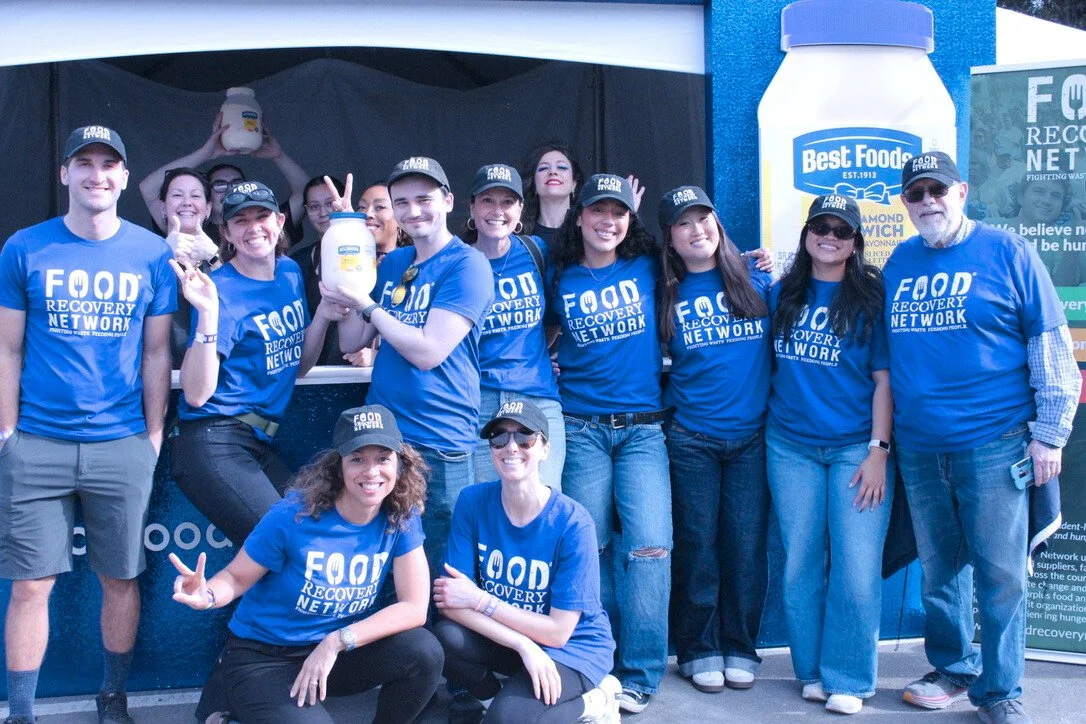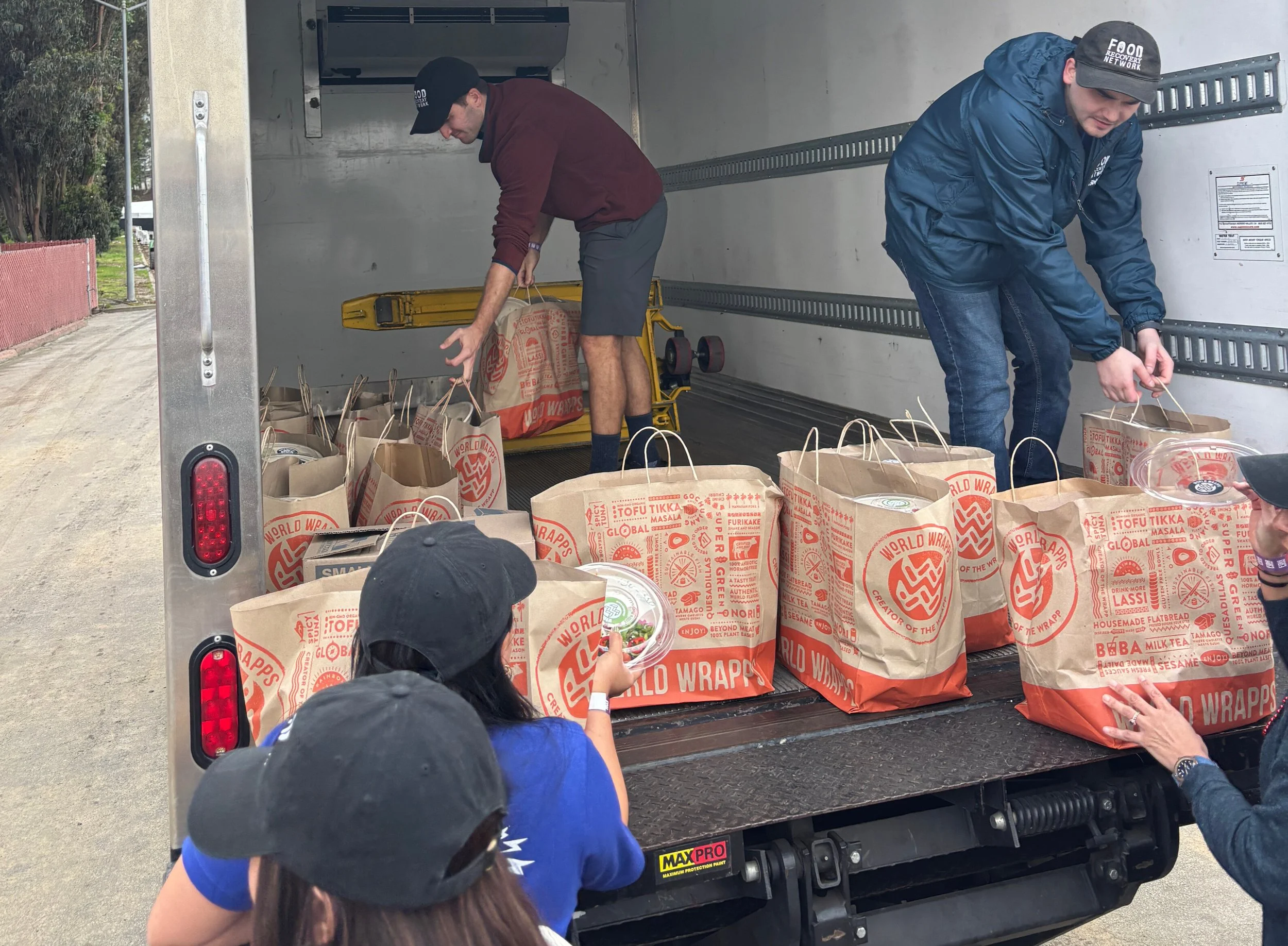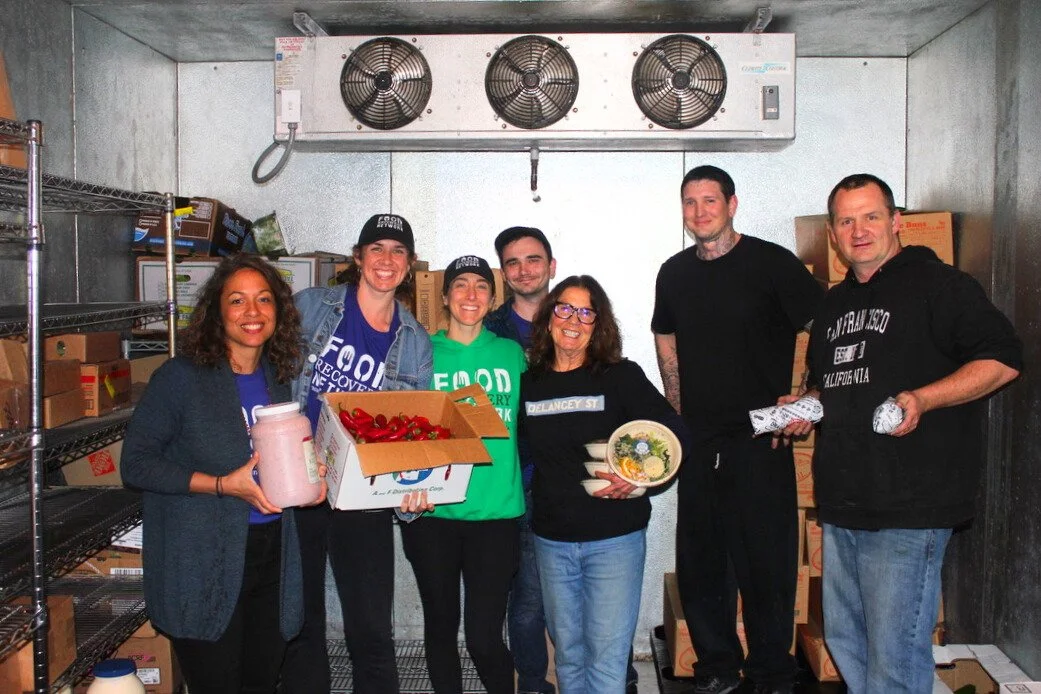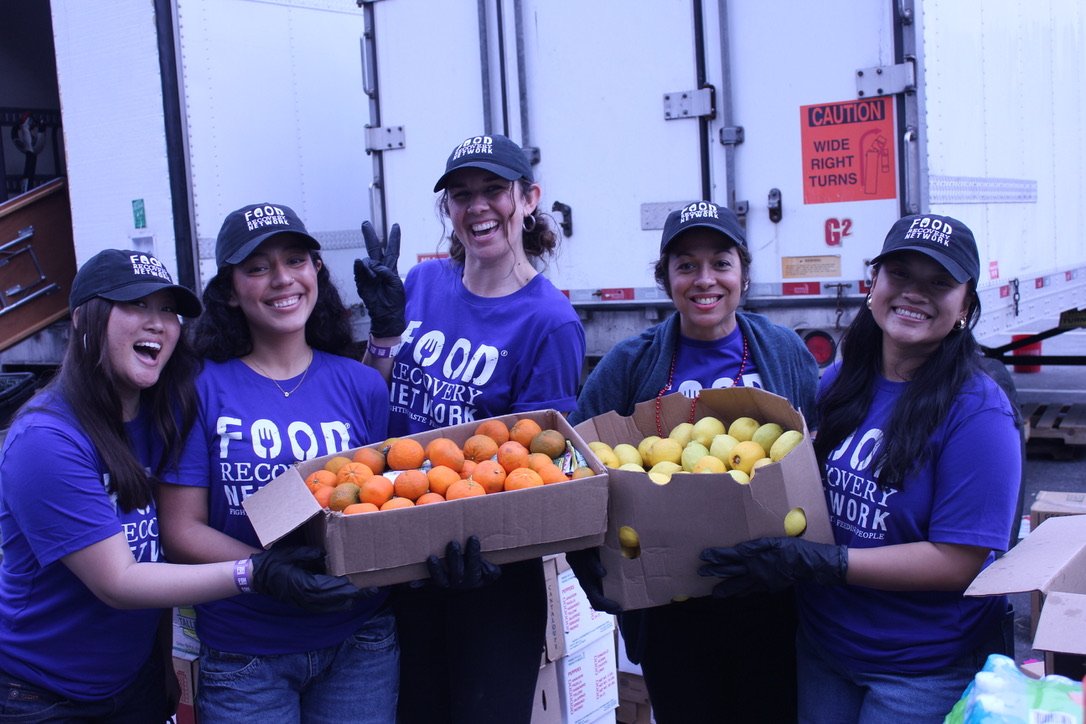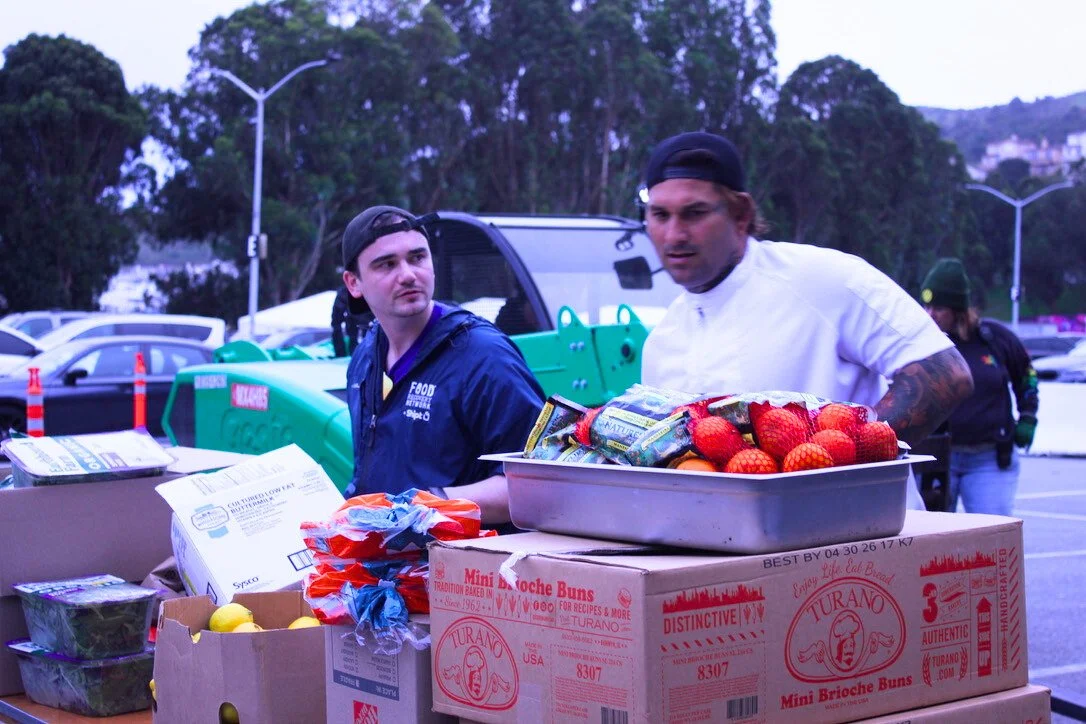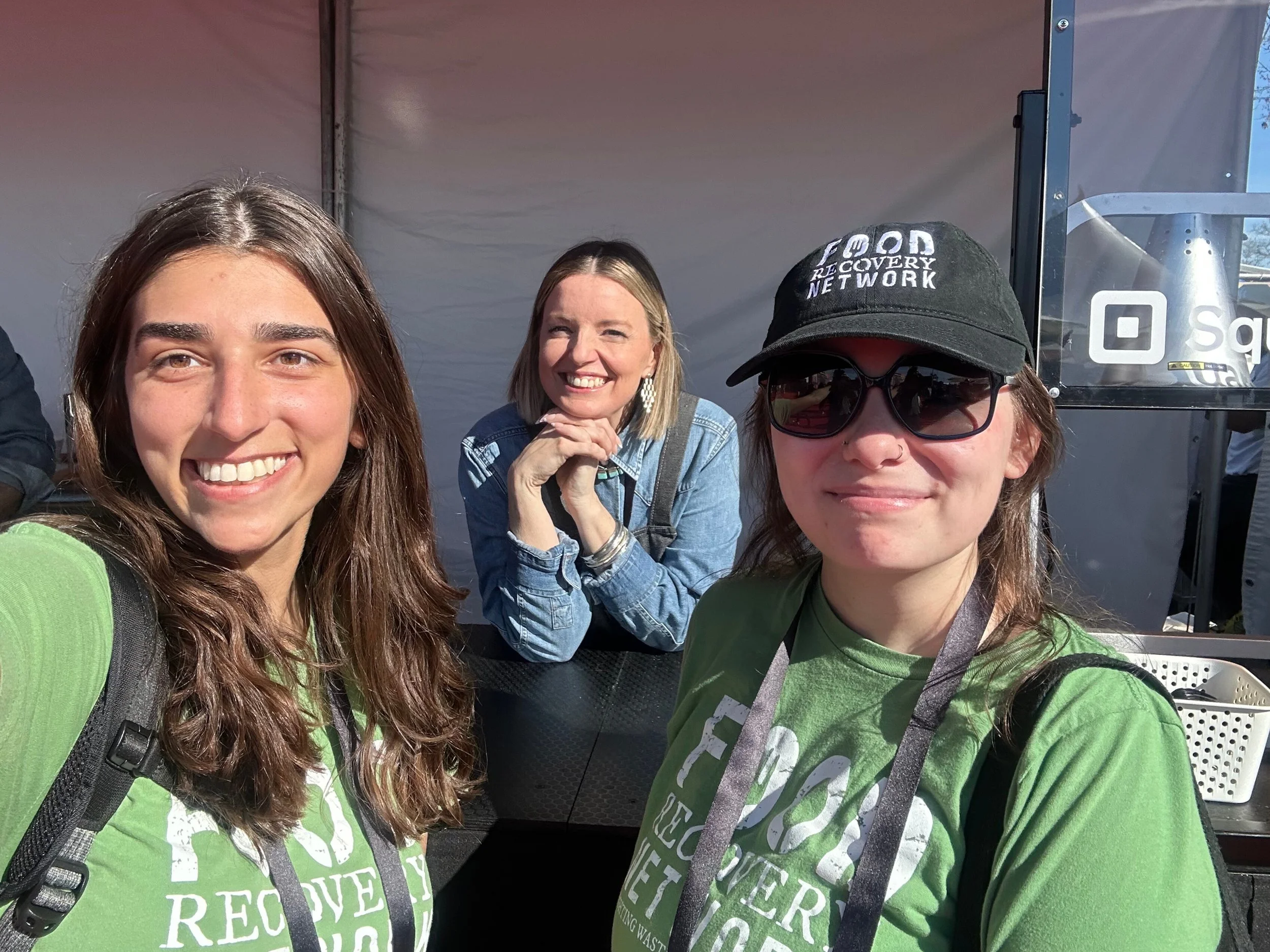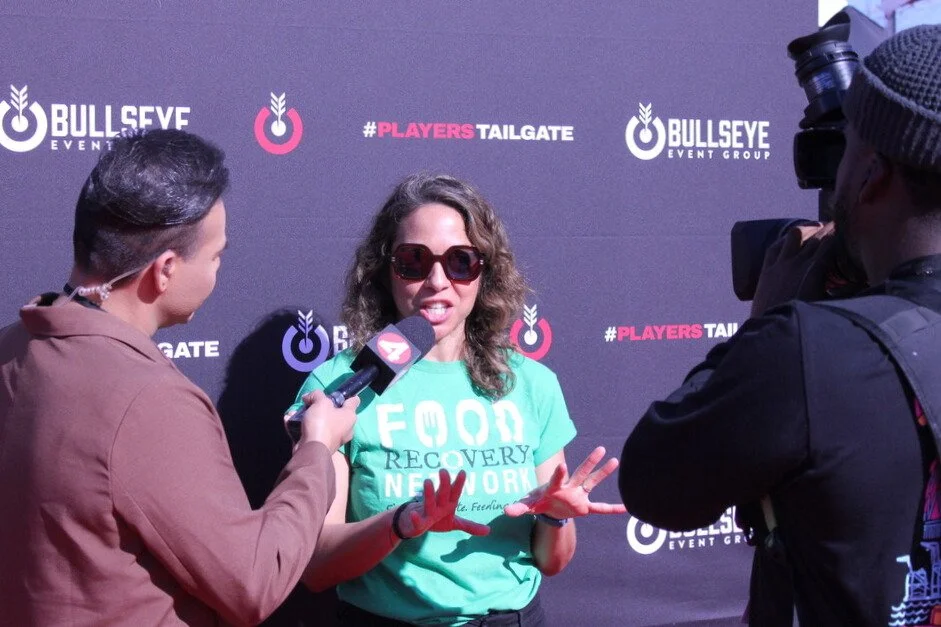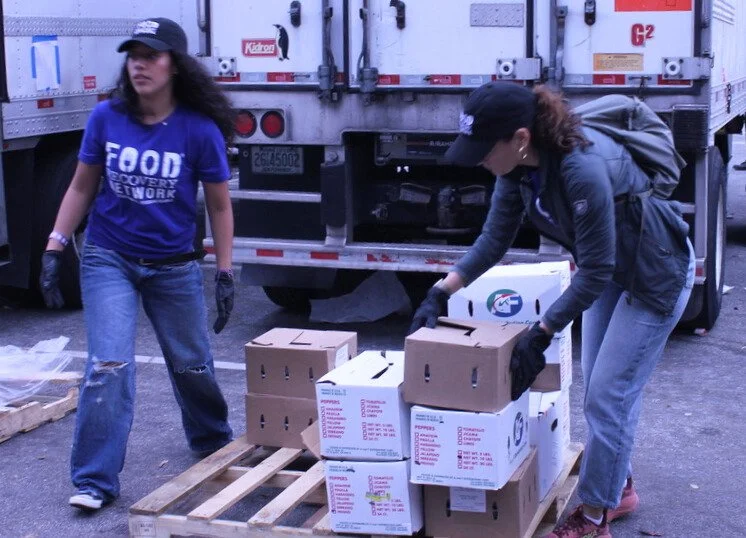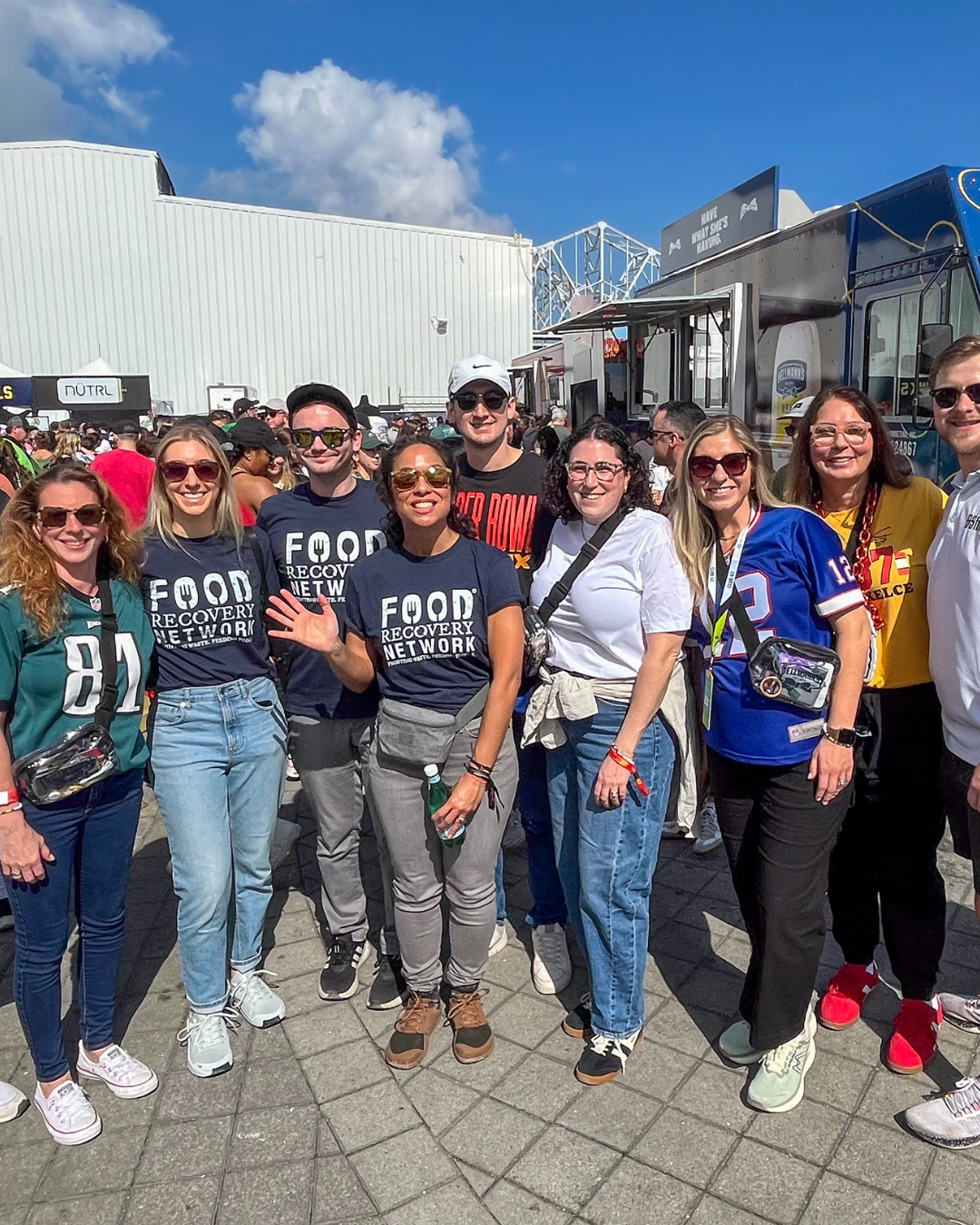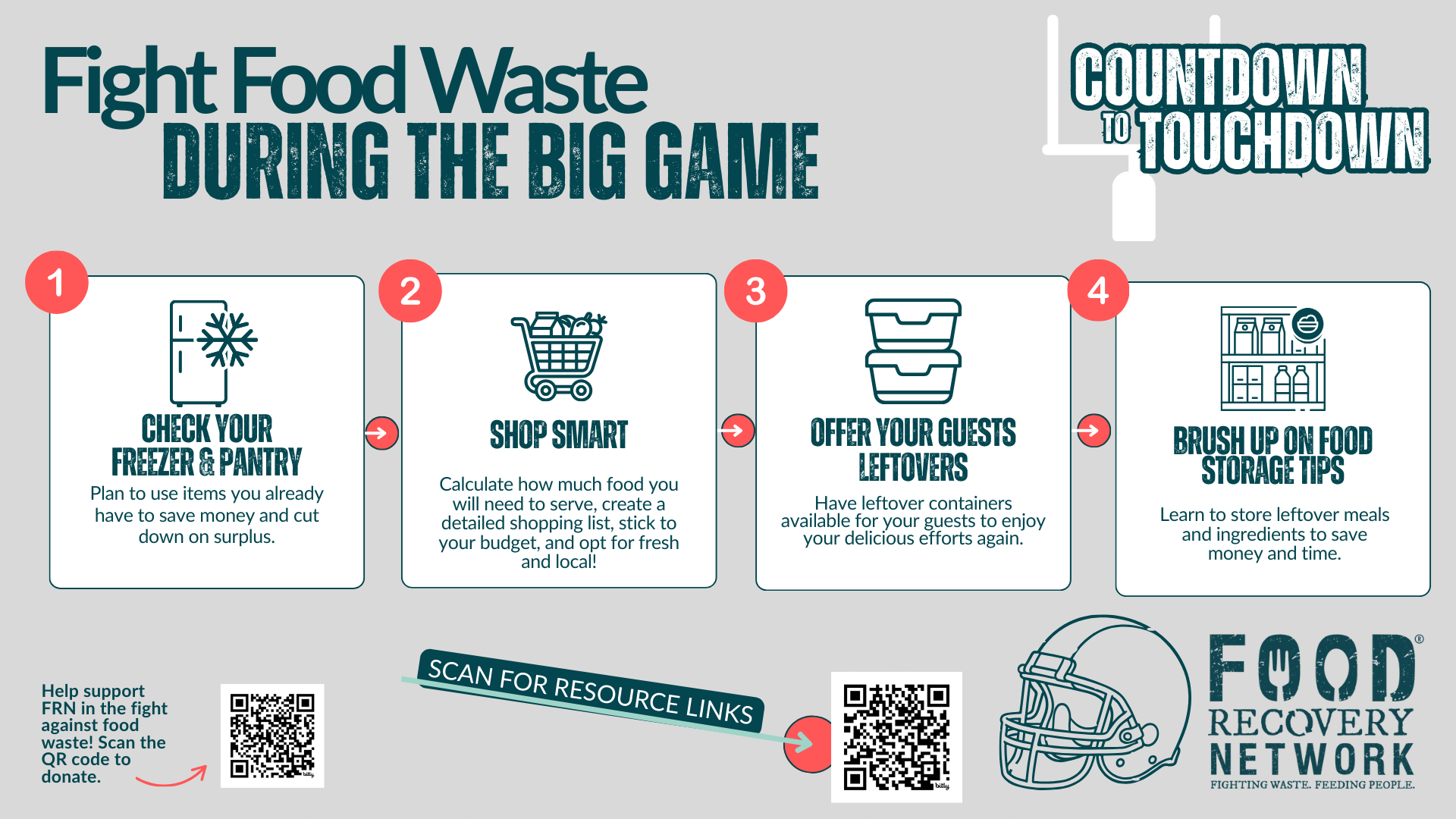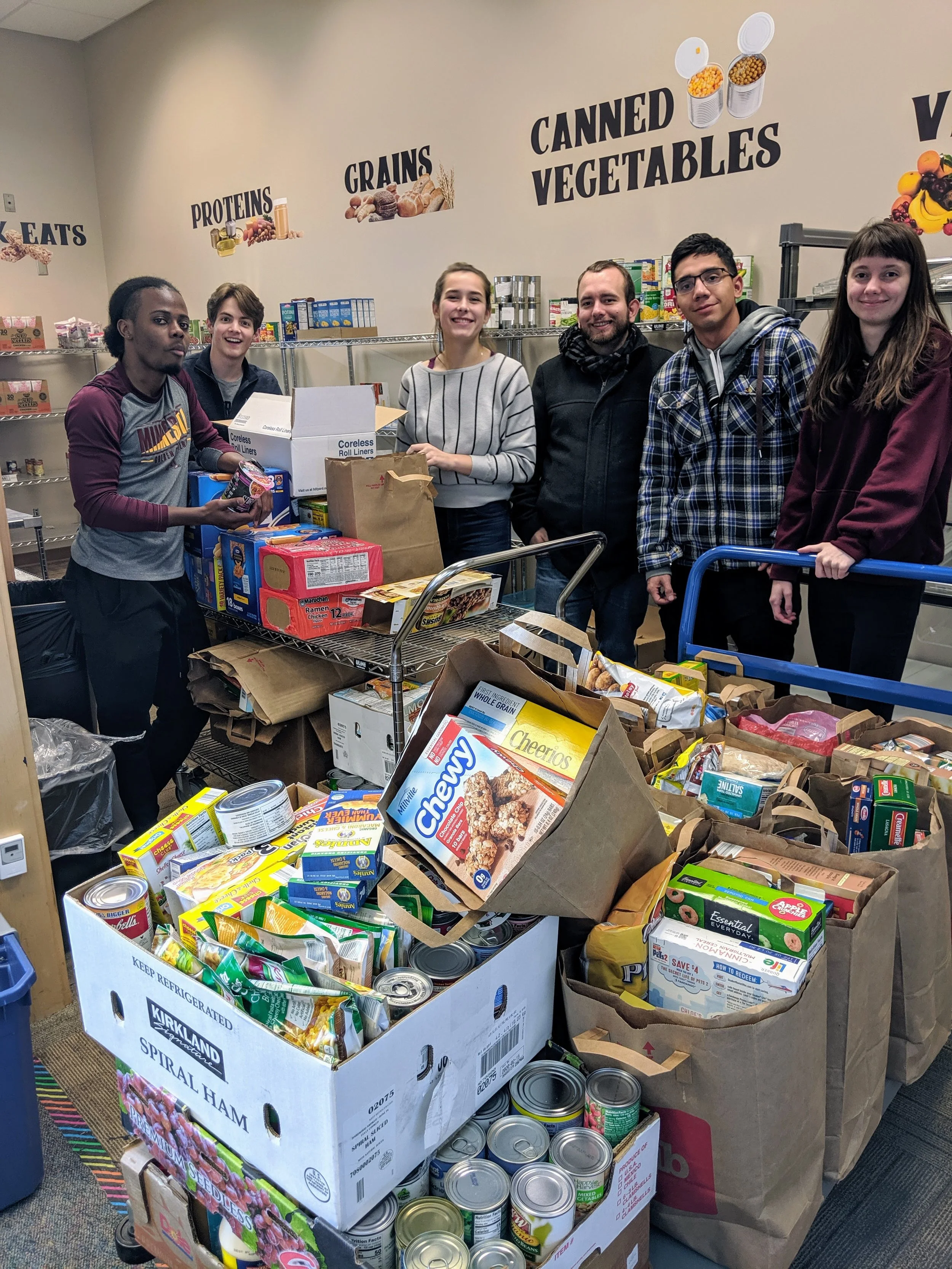
Recently published news and opinions from Food Recovery Network
2 Events, One Afternoon, 12,000 Meals Back To Bay Area Individuals Experiencing Hunger
Food Recovery Network (FRN) set a record this year by recovering 14,017.37 pounds of food from Big Game tailgates in just one afternoon.
Santa Clara, CA —Food Recovery Network (FRN) set a record this year by recovering 14,017.37 pounds of food from two Big Game tailgates in just one afternoon. As players gathered for the coin toss and fans waited anxiously for kickoff, FRN volunteers and team were already behind the scenes, recovering food from two of the largest tailgate parties in the nation. When Guy Fieri’s Flavortown Tailgate and The Players Tailgate bid adieu to guests, FRN got to work packaging up all of the perfectly good, unserved food, loaded up rented vans and trucks to get that food to agencies serving people experiencing hunger in the Bay Area.
For the past six years, FRN has teamed up with Bullseye Events Group to recover surplus food from the Players Tailgate, and for the second year, through a partnership with Hellmann’s Mayonnaise, had boots on the ground at Guy Fieri’s Flavortown Tailgate, ensuring that high-quality food didn’t go to waste and would be used to nourish families experiencing hunger in the Bay Area. FRN’s 6-year impact just rose to over 40,000 pounds in total!
Said FRN CEO Regina Harmon, "We are truly grateful for our partnership with Hellmann's Mayonnaise in our food recovery initiative at Guy Fieri's Flavortown Tailgate. Recovering surplus food requires people power, transportation vehicles, packaging supplies, and items like thermometers to ensure food safety. We depend on donors' support to ensure that high-quality food does not go to waste and helps feed individuals experiencing hunger in communities across the United States. And we are actively seeking sponsorships and donations at all levels.”
Two Events By The Numbers
Total Impact:
POUNDS: Recovered 14,090.37 pounds of fresh surplus food
MEALS: Provided the equivalent of 11,681 meals
CO2e: Prevented 8.83 metric tons of CO2e, which is the same as 2 passenger vehicles driven for one year being off the road.
WATER: Saved 1.66 million gallons of water, the same as 3 Olympic swimming pools.
Individual Event Impact:
Guy Fieri's Flavortown:10,683 pounds recovered
The Player's Tailgate: 3,407.37 pounds recovered
Hunger Fighting Partner Organizations:
Delancey Street Foundation
Loaves & Fishes Family Kitchen
Hunger at Home
Food Items Recovered Include:
Various Soups and Sauces such as crab soup, cheese sauce, jalapeño dip (20+5-gallon buckets)
Produce such as Apple Slices (multiple cases), Carrots, Lemons, Limes, Oranges, Fresh Herbs, Avocados, Tomatillos
Dairy such as Butter, Buttermilk, Sliced Cheese, 15-20 dozen eggs
Snack Items such as Pretzel Bites and Donkey Sauce
High Value Protein, such as 6 Trays of Artisan Sausage, Chef-Prepared Chicken and Burgers, Burnt Beef Ends, Uncooked Bacon, Crab Rangoon
This year, Food Recovery Network student chapter members and alumni from the University of San Francisco and San Francisco State University helped to facilitate these crucial food recovery efforts. With more than 200 college chapters nationwide and an active network of 8,000 students and partners, FRN is dedicated to advancing food justice through its three-tiered mission: recovering surplus food, reducing environmental impact by diverting food from landfills, and delivering high-quality meals to individuals experiencing hunger.
In addition to its work at the Big Game, FRN's business service initiatives extend beyond the football field. A recent partnership with Gaylord Hotels in Washington, D.C., and San Diego has led to a 100,000-pound recovery milestone. “Food recovery is essential to reaching our sustainability goals,” said Ryan Verhulst, Hotel Manager at Gaylord National. “As part of the Marriott family, we emphasize nurturing our world and reducing our environmental footprint. Partnerships like the one we have with Food Recovery Network help us achieve these goals while giving back to local families in need.” FRN will mark 100,000 pounds from Gaylord alone within the next few weeks.
As individuals and communities begin to plan for spring and summer festivals and events, Food Recovery Network calls on our nation to join them in this vital mission to end hunger and promote food justice. For information about Food Recovery Network’s Event Services and Food Recovery Verified business program, visit foodrecoverynetwork.org.
*To request an interview, contact Sarah Corbin, Director of Communications at sarah.corbin@foodrecoverynetwork.org.
###
Food Recovery Network (FRN) is the largest student-led movement recovering surplus food and ending hunger in the U.S. We unite 8,000+ college students, food suppliers, farmers, and local businesses across the U.S. in the fight against climate change and hunger by recovering surplus food from across the supply chain and donating it to local nonprofit organizations that feed people experiencing hunger.
Largest Student-Led Organization Tackles Food Waste to Feed Hungry Families at San Francisco’s Biggest Tailgate Party
– As excitement builds for the Big Game in Santa Clara, local tailgate parties are set to take center stage. Among the festivities, Food Recovery Network (FRN) sees these events as vital opportunities to combat hunger in our communities. At Guy Fieri’s Flavortown Tailgate, Hellmann’s Mayonnaise and FRN will work together to ensure that no surplus food goes to waste, benefiting families in need in the Bay Area.
**FOR IMMEDIATE RELEASE**
San Francisco, CA – As excitement builds for the Big Game in Santa Clara, local tailgate parties are set to take center stage. Among the festivities, Food Recovery Network (FRN) sees these events as vital opportunities to combat hunger in our communities. At Guy Fieri’s Flavortown Tailgate, Hellmann’s Mayonnaise and FRN will work together to ensure that no surplus food goes to waste, benefiting families in need in the Bay Area.
For the third consecutive year, Hellmann’s is partnering with FRN—which has recovered surplus food from the Big Game for multiple years—to rescue high-quality food from Big Game tailgates and redirect it to communities in need.
“We’re proud to partner once again with Food Recovery Network to make food recovery part of the Big Game experience,” said Jessica Grigoriou, Senior Vice President of Condiments Marketing in North America, Unilever. “By rescuing high-quality surplus food from events like Guy Fieri’s Flavortown Tailgate and inspiring people to see the value in their own leftovers, we’re showing how small actions can add up to real impact—because good food should be enjoyed, not wasted.”
Last year, FRN achieved remarkable success during the Big Game, recovering 12,348 pounds of surplus food from two Hellmann’s-supported recovery events in one day, equating to approximately 10,290 meals that were provided to the New Orleans Mission. The recovery included high-value items such as seafood, chicken, and butter—essential ingredients that significantly impact local organizations fighting hunger.
This year, FRN is ready to make an even larger impact in the Bay Area. FRN staff, alongside dedicated students and alumni from the University of San Francisco, Cal Poly, San Francisco State University, and Case Western Reserve, will be on-site at Guy Fieri’s Flavortown Tailgate. All recovered food will be donated to the Delancey Street Foundation and Samaritan House, vital resources for people experiencing food insecurity in the area.
Regina Harmon, CEO of Food Recovery Network, expressed her gratitude, stating, “Hellmann's has been unwavering in their support of our food recovery efforts over the past three years and in our mission to raise awareness about preventing food waste. Their partnership has been instrumental in our efforts to recover high-quality surplus food, enabling us to help local families experiencing hunger. Together, we are making a meaningful impact on both hunger and sustainability.”
FRN’s commitment to large-scale food recovery extends beyond the festivities of the football game. A recent partnership with Gaylord Hotels in Washington, D.C., and San Diego has resulted in over 100,000 pounds of food saved over the last few years. Ryan Verhulst, Hotel Manager at Gaylord National, stated, “Food recovery is essential to reaching our sustainability goals. As part of the Marriott family, we emphasize nurturing our world and reducing our environmental footprint. This includes decreasing our food waste and increasing our contribution to our community. Partnerships like the one we have with Food Recovery Network help us reach our goals while also giving back to local families in need."
For more information, please contact: Sarah Abboreno Corbin, 708-714-1357 (c), sarah.corbin@foodrecoverynetwork.org
***
Food Recovery Network (FRN) is the largest student-led movement recovering surplus food and ending hunger in the U.S. We unite 8,000+ college students, food suppliers, farmers, and local businesses across the U.S. in the fight against climate change and hunger by recovering surplus food from across the supply chain and donating it to local nonprofit organizations that feed people experiencing hunger.
About Unilever in North America
Unilever is one of the world’s leading suppliers of Beauty & Wellbeing, Personal Care, Home Care, and Foods products, with sales in over 190 countries and products used by 3.4 billion people every day. We have 128,000 employees and generated sales of €60.8 billion in 2024.
Our leading brands in North America include Dove, Hellmann’s, Vaseline, Degree, Axe, TRESemmé, Knorr, Nutrafol, Liquid I.V., Paula’s Choice, and Dermalogica.
For more information on Unilever U.S. and its brands visit: www.unileverusa.com
For more information on Unilever Canada and its brands visit: www.unilever.ca
It's the Big Game - Fight Food Waste in a Big Way
Fight food waste during the Big Game by using Food Recovery Network’s tips.
Make a commitment to fight food waste at home. Every action makes an impact.
Check your freezer and pantry. Plan to use items you already have to save money and cut down on surplus.
Shop smart. Calculate how much food you will need to serve, create a detailed shopping list, stick to your budget and opt for fresh and local.
Offer your guests leftovers. Have leftover containers available for your guests to enjoy your delicious efforts again.
Brush up on food storage tips. Learn to store and MORE LEFTOVERS and ingredients to save money and time.
Support Food Recovery Network’s efforts to end food waste, end hunger and make a positive impact on our climate.
Student-Led Food Recovery Network Tackles Hunger by Recovering Surplus Food from Player’s Tailgate
Santa Clara, CA – As anticipation builds for the Big Game in Santa Clara, Food Recovery Network (FRN) is excited to announce its ongoing efforts to convert tailgate festivities into a powerful opportunity to combat hunger in local communities. For the past six years, FRN has teamed up with Bullseye Events Group to recover surplus food from the Player’s Tailgate, ensuring that high-quality food does not go to waste but instead nourishes families in need.
FRN has successfully recovered over 16,000 pounds of food from this singular Big Game event over the past 6 years, providing more than 13,000 meals to individuals and families experiencing hunger in cities such as New Orleans, Las Vegas, Glendale, Los Angeles, Miami. That means FRN has also prevented 10.07 metric tons of CO2e from entering our atmosphere - that’s the equivalent of 25,000 miles driven by the average gasoline powered car.
“For Bullseye Event Group, the Player’s Tailgate has always been about more than creating an unforgettable game-day experience. It’s about being a responsible partner to the communities we touch,” said Kyle Kinnett, CEO of Bullseye Event Group. "For the sixth consecutive year, we’re proud to work alongside Food Recovery Network to ensure surplus food from this event is redirected to families in need rather than going to waste. This partnership reflects our belief that large-scale events can – and should – leave a positive social and environmental impact long after the final whistle.”
This year, volunteers from the University of San Francisco, along with alumni from schools such as Cal Poly, San Francisco State University, and Case Western Reserve, will be on the ground at The Player’s Tailgate to facilitate these crucial food recovery efforts.
FRN CEO Regina Harmon, “We can be part of a solution to what is, right now, a very big and deep problem of food insecurity. Eighteen million tons of food from consumer-facing businesses is wasted each year across the United States. If we each ensured the businesses in the circumference of our lives established a food recovery plan, our neighborhoods, and the neighborhoods the next town over, and the next state over, would transform right before our eyes. That is the power that we have. If we want it.”
With more than 200 college chapters nationwide and an active network of 8,000 students and partners, FRN is dedicated to advancing food justice through its three-tiered mission: recovering surplus food, reducing environmental impact by diverting food from landfills, and delivering high quality meals to individuals experiencing hunger.
In addition to its work at the Super Bowl, FRN's initiatives extend beyond the football field. A recent partnership with Gaylord Hotels in Washington, D.C., and San Diego has resulted in reaching a 100,000-pound recovery milestone in the past month. “Food recovery is essential to reaching our sustainability goals,” said Ryan Verhulst, Hotel Manager at Gaylord National. “As part of the Marriott family, we emphasize nurturing our world and reducing our environmental footprint. Partnerships like the one we have with Food Recovery Network help us achieve these goals while giving back to local families in need.”
Furthermore, we can all make a significant impact on reducing food waste in our homes, particularly during festive occasions celebrated across the country. Minnie Ringland, Senior Manager of Climate & Insights at ReFED, states, "Nearly 30% of our food supply goes uneaten, and that problem is on full display on days like Super Bowl Sunday, when there's more of a focus on serving your favorites than there is on what will be left behind. But when food waste accounts for nearly four percent of U.S. greenhouse gas emissions, putting in an effort to limit waste—whether that's by being conscious of how much you prepare or taking steps to send leftovers home with guests—makes a difference!
As the Big Game approaches, the Food Recovery Network is calling on the community to join them in this vital mission to end hunger and promote food justice in Santa Clara and beyond.
**For more information about the Food Recovery Network and its initiatives, visit foodrecoverynetwork.org and contact sarah.corbin@foodrecoverynetwork.org .
Food Recovery Network (FRN) is the largest student-led movement recovering surplus food and ending hunger in the U.S. We unite 8,000+ college students, food suppliers, farmers, and local businesses across the U.S. in the fight against climate change and hunger by recovering surplus food from across the supply chain and donating it to local nonprofit organizations that feed people experiencing hunger.
Opening Soon: Community College Food Recovery Grant Application
OPENING SOON - COMMUNITY COLLEGE FOOD RECOVERY GRANT APPLICATION
Join our network of over 8,000+ college students, food suppliers, farmers, and local businesses across the U.S. in the fight against climate change and hunger by recovering surplus food.
Check back on February 19th for more information about our upcoming grant cycle.
To help expand FRN’s presence in community colleges nationwide, FRN is entering the third year of our community college grant program to help establish food recovery programs at community colleges across the U.S. Community Colleges will be selected to receive one year of technical and financial assistance to set up food recovery programs on their campus to begin the Fall of 2026. The grant recipients will also be awarded recognition and serve as models for how community colleges can play a vital role in helping feed community members in need. Read about our 2024 Cohort.
Community College Food Recovery Cohort Details
In order to receive funding, each community college will need one person who will be responsible for implementing this program and liaising directly with FRN.
For this grant, FRN national staff will:
Coordinate the purchase or donation of all relevant materials, including packaging, transportation, and all other logistics
Administer all aspects of work, including providing supplies, marketing, and staff and volunteers
Serve as liaison between food donation partners to ensure fair negotiation of cost and labor is accounted for in work
Serve as liaison between community partners
Share public learnings and data with project partners and our network of stakeholders
Recognize and promote partners and work on social media and to our network of stakeholders
Train relevant local food business professionals and school cafeteria staff on how to safely conduct food recoveries over the long term (as needed)
Make direct connections with FRN alumni and students at local colleges and universities to support project efforts (as needed)
This point of contact will:
Provide daily management of all project logistics, including onboarding of partners
Promote the program to the school community via flyers, emails, or whichever other communication channels are most appropriate
Support in coordinating food recovery program logistics, including securing the most appropriate physical space (as needed)
Help determine the pace, frequency, etc. of recovery efforts
Gather feedback on program from students and families to ensure we’re meeting the needs of the community
Provide relevant school data, such as number of students, to help better guide our work
Help facilitate connections with local partners to help onboard pilots and achieve our desired outcomes

